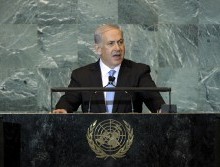If there was any ambiguity in the red lines called for by Prime Minister Benjamin Netanyahu regarding Iran’s nuclear program, the Israeli leader made his position clear on Thursday in a speech to the United Nations. Netanyahu called for the world to set the line at preventing Iran from achieving a critical mass of medium-level uranium enrichment, a level which is still useful for civilian purposes but is also well on the way to weapon’s grade nuclear fuel.
Netanyahu also made clear he wasn’t seeking war with his call for an ultimatum. “Red lines don’t lead to war; red lines prevent war,” he told the annual UN General Assembly meeting, according to a transcript released by his office.
Calling such a red line the “only one way to peacefully prevent Iran from getting atomic bombs,” Netanyahu pointed out that red lines worked with Iran when they threatened to block the Straits of Hormuz, a key oil shipping line. The United States responded with a red line and Iran backed down.
Regarding the red line, Netanyahu said that despite the capabilities of intelligence agencies, preventing Iran from assembling a nuclear weapon once it has the necessary ingredients will prove extremely difficult.
“They are not foolproof,” Netanyahu said of the agencies. “For over two years, our intelligence agencies didn’t know that Iran was building a huge nuclear enrichment plant under a mountain. Do we want to risk the security of the world on the assumption that we would find in time a small workshop in a country half the size of Europe?”
Read Netanyahu’s entire speech here
In contrast, the Israeli leader argued that threatening and hitting Iran’s enrichment facilities is much more achievable—hence drawing the red line at Iran’s amassing enough medium-level enriched uranium for a nuclear weapon, lest Iran finish the enrichment process in the highest grade and be capable of building one.
“The relevant question is not when Iran will get the bomb. The relevant question is at what stage can we no longer stop Iran from getting the bomb,” said Netanyahu. “The red line must be drawn on Iran’s nuclear enrichment program because these enrichment facilities are the only nuclear installations that we can definitely see and credibly target.”
Despite the threats of potential conflict if necessary, Netanyahu made clear the red line plan was not to force a war—rather it’s to avoid one. “I believe that faced with a clear red line, Iran will back down. This will give more time for sanctions and diplomacy to convince Iran to dismantle its nuclear weapons program altogether.”
Initial Response
The international community did not leap to embrace Netanyahu’s message. In a background briefing on a meeting of the P5+1, which is spearheading international negotiations with Iran over the nuclear matter, a Senior US State Department Official effectively dodged a question over Netanyahu’s approach to Iran.
According to a transcript released by the US State Department, when asked if the P5+1 discussed the red lines, the official said, “I think we all heard the speech today, and we will continue to have our discussions. As the Prime Minister said, we consult very closely together. We are in discussions together. We are proceeding forward in both wanting to use diplomacy as the way ahead. And so that is how we are proceeding.”
Netanyahu, in his speech, warned that a nuclear Iran would pose a threat for not just Israel, but the entire world. Comparing the terrorism-sponsoring Iran with a nuclear-armed Al Qaeda, the Israeli leader said, “At stake is not merely the future of my own country. At stake is the future of the world. Nothing could imperil our common future more than the arming of Iran with nuclear weapons.
“…Imagine their long range missiles tipped with nuclear warheads, their terror networks armed with atomic bombs. Who among you would feel safe in the Middle East? Who would be safe in Europe? Who would be safe in America? Who would be safe anywhere?”
Netanyahu said he believed that good would ultimately triumph regardless, but feared an unacceptable cost to such a victory if steps were not taken beforehand. “Some 70 years ago, the world saw another fanatic ideology bent on world conquest,” said Netanyahu, referring to Nazi Germany. “It went down in flames. But not before it took millions of people with it. Those who opposed that fanaticism waited too long to act. In the end they triumphed, but at a horrific cost.
“My friends, we cannot let that happen again.”
(By Joshua Spurlock, www.themideastupdate.com, September 27, 2012)

